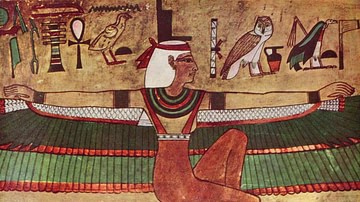Search
Search Results

Video
The making and worship of Ganesha statues in Maharashtra
Made to accompany From temple to home: celebrating Ganesha, a display at the British Museum from 27 February — 25 May 2014 http://www.britishmuseum.org/whats_on/exhibitions/celebrating_ganesha.aspx Explore the iconography of and find...

Article
Religion in Ancient China
Religious practices in ancient China go back over 7,000 years. Long before the philosophical and spiritual teachings of Confucius and Lao-Tzu developed or before the teachings of the Buddha came to China, the people worshipped personifications...

Image Gallery
A Gallery of 20 Mummies from around the World
Mummification is the natural or artificial preservation of the soft tissue of a dead body. Natural mummification can happen in extremely cold, dry, or anaerobic conditions. Perhaps the most famous example of a natural mummy preserved in ice...

Article
Monotheism in the Ancient World
Monotheism is simply defined as the belief in one god and is usually positioned as the polar opposite of polytheism, the belief in many gods. However, the word monotheism is a relatively modern one that was coined in the mid-17th century...

Definition
Ancient China
Ancient China produced what has become the oldest extant culture in the world. The name 'China' comes from the Sanskrit Cina (derived from the name of the Chinese Qin Dynasty, pronounced 'Chin') which was translated as 'Cin' by the Persians...

Definition
Shang Dynasty
The Shang Dynasty (c. 1600-1046 BCE) was the second dynasty of China, which succeeded the Xia Dynasty (c. 2070-1600 BCE) after the overthrow of the Xia tyrant Jie by the Shang leader, Tang. Since many historians question whether the Xia Dynasty...

Definition
Yahweh
Yahweh is the name of the state god of the ancient Kingdom of Israel and, later, the Kingdom of Judah. His name is composed of four Hebrew consonants (YHWH, known as the Tetragrammaton) which the prophet Moses is said to have revealed to...

Definition
Isis
Isis is an ancient Egyptian goddess who became the most popular and enduring of all the Egyptian deities. Her name comes from the Egyptian Eset, ("the seat") which referred to her stability and also the throne of Egypt as she was considered...

Definition
Anahita
Anahita is the ancient Persian goddess of fertility, water, health and healing, and wisdom. Owing to her association with life-giving properties, she also came to be connected with ancient Persian warfare as soldiers would pray to her for...

Definition
Assur
Assur (also Ashur, Anshar) is the god of the Assyrians who was elevated from a local deity of the city of Ashur to the supreme god of the Assyrian pantheon. His attributes were drawn from earlier Sumerian and Babylonian deities and so he...